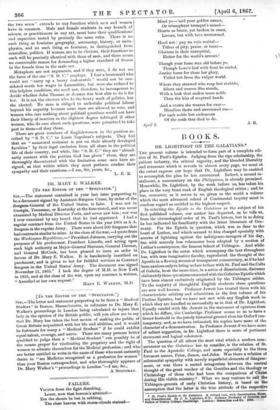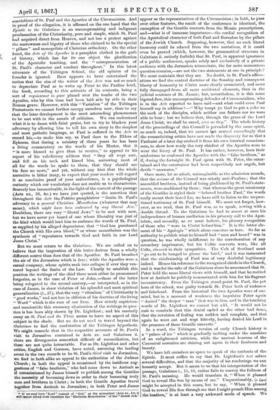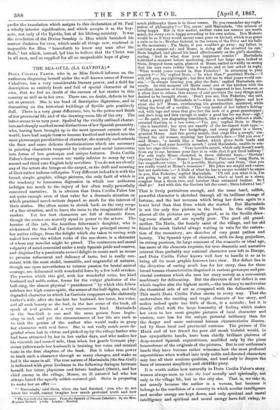BOOKS.
DR. LIGHTFOOT ON THE GALATIANS.* THE present volume is intended to form part of a complete edi- tion of St. Paul's Epistles. Judging from the ripe scholarship, the patient industry, the critical sagacity, and the blended liberality and reverence which it reveals in almost every page, we must at the outset express our hope that Dr. Lightfoot may be enabled to accomplish the plan he has announced. Indeed, a second in- stalment, a commentary on the Philippians, is already promised. Meanwhile, Dr. Lightfoot, by the work before us, has taken his place in the very front rank of English theological critics ; and he has, moreover, as it seems to us, given to the world a volume which the most advanced school of Continental inquiry must in candour regard as entitled to the highest respect.
In selecting the Epistle to the Galatians as the subject of his first published volume, our author has departed, as he tells us, from the chronological order of St. Paul's letters, but in so doing he has indicated his familiarity with the latest literature of Ger- many. For the Epistle in question, which was so dear to the heart of Luther, and which seemed to him charged specially with arrows of lightning against the indulgence-mongers of his day, has with scarcely less vehemence been adopted by a section of Luther's countrymen, the famous School of Tiibingen. And while Dr. Lightfoot in the notes which accompany the text throughout has, with true imaginative faculty, reproduced the thought of the Apostle in a flowing stream of transparent commentary, as if he had been anxious onlyto bring us face to face with St. Paul and the Celts of Galatia, he at the same time, in a series of dissertations, discusses elaborately those questions connected with the Galatian Epistle which have been almost exclusively originated by the Tubingen critics. To the majority of thoughtful English students these questions are now well known. Professor Jowett has treated them with his characteristic subtlety and eclecticism, in the first volume of his Pauline Epistles, but we have not met with any English work in which they are handled so successfully as in that of Dr. Lightfoot. Equally candid with Mr. Jowett in the statement of opinions from which he differs, the Cambridge Professor seems to us to have a firmer foothold in the purely historical ground than his Oxford con- temporary, and, as we have intimated, his replies hate more of the character of a demonstration. In Professor Jowett if we have more of salient suggestion, in Dr. Lightfoot there is more of pertinent statement and logical coherence.
The question of all others the most vital which a modern com- mentator on the Galatians has to consider, is the relation of St. Paul to the Apostolic College, and more especially to the three foremost names, Peter, James, and John. Was there a relation of aubstantial sympathy with merely superficial elements of disagree- ment, or was there a rooted antagonism between the central thought of the great teacher of the Gentiles and the theology or Christology of those who had been the companions of Christ during His visible ministry ? What we may venture to call the Tiibingen-genesia of early Christian history, is based on the assumption that the latter is the true attitude of the respective • St. Paul's Epistk to the Galatians. A revised text, with Introduction, Note., and Dissertation. 137 J. B. Lightfoot, D.D., Hulsean Professor of Divinity, and Fellow of Trinity College, Cambridge. London: Macmillan and Ca 1866. convictions of St. Paul and the Apostles of the Circumcision. And in proof of the allegation, it is affirmed on the one hand that the Epistle to the Galatians is an uncompromising and indignant proclamation of the Christianity, pure and simple, which St. Paul had acquired direct from Heaven, and not less a protest against the narrowness and bigotry of those who claimed to be the special "pillars" and monopolists of Christian orthodoxy. On the other hand, the Acts of the Apostles is a pamphlet clothed in the garb of history, which has for its one object the glorification of the Apostolic teaching, and the "misrepresentation of St. Paul's character and conduct throughout." In this latest utterance of the Tiibingen School, the old opinion of its founder is ignored. Baur appears to have entertained the notion that the aim of the writer of the Acts was not so much to depreciate Paul as to write up Peter to the Pauline level, the book, according to this estimate of its contents, being a sort of requiescant in pace placed over the tombs of the two Apostles, who by this time had been laid side by side in their Roman grave. However, with this " Variation " of the Tubingen Protestants we cannot further occupy ourselves now, than to say that the later development is the most astounding phenomenon to be met with in the annals of criticism. We can understand what it is to damn with faint praise, but to try to blacken your adversary by allowing him to tell his own story in the simplest and most pathetic language, as Paul is suffered in the Acts to record his,—to make him say, as Paul does to the Elders of Ephesus, that during a ministry of three years he has been a living commentary on the words of his Master, that it "is more blessed to give than to receive," to append to his report of his valedictory address that "they all wept sore, and fell on his neck and kissed him, sorrowing most of all for the words he spoke to them, that they should see his face no more," and yet, without any hint that the whole narrative is bitter irony, to expect that your readers will regard it as conclusive proof of your malevolence, is a psychological curiosity which our vocabulary does not enable us to characterize. Scarcely less inconceivable, in the light of the context of the passage (Acts XX., 36, &c.) we have just quoted, is the assertion that throughout the Acts the Petaine pamphleteer "limits St. Paul's advocacy to a general Christian Monotheism (whatever that may mean), which might have been embraced by any liberal Jew." Doubtless, there are very "liberal Jews" to be met with now, but we have never yet heard of one whose liberality was just of the kind which would lead him to embrace the words of St. Paul, as supplied by his alleged depreciator, that "God has purchased the Church with His own blood,"* or whose monotheism was the synthesis of "repentance towards God and faith in our Lord Jesus Christ."
But we must return to the Galatians. We are called on to believe that the inspiration of this letter derives from a wholly different source than does that of the Apostles. St. Paul breathed the air of the Jerusalem which is free ; while the Apostles were a carnal company, whose spirits sank into collapse if ever they ven- tured beyond the limits of the Law. Clearly to establish this position the writings of the chief three must either be pronounced forgeries, as in the case of Peter or John,—those of the latter being relegated to the second century,—or interpreted, as in the case of James, in sheer violation of his splendid and most spiritual generalization (i., 27), that the very " ritualism " of Christianity is "good works," and not less in oblivion of his doctrine of the living " Word" which is the root of our lives. How utterly capricious and unscientific this summary elimination of the writings in ques- tion is has been ably shown by Dr. Lightfoot ; and his masterly essay on St. Paul and the Three seems to leave no aspect of this subject in the shade. But we do not need to travel beyond the Galatians to find the confutation of the Tubingen hypothesis. We might concede that in the respective accounts of St. Paul's visit to Jerusalem contained in Acts xv. and Galatians ii. there are divergencies somewhat difficult of reconciliation, but these are not quite intractable. For as Dr. Lightfoot and other critics, English and German, have noted, assuming the leading event in the two records to be St. Paul's third visit to Jerusalem, we find in both alike an appeal to the authorities of the Judie= Church ; in both the appeal is occasioned by the insidious sug- gestions of "false brethren," who had come down to Antioch as if commissioned by James himself to publish among the Gentiles the necessity of becoming Jews in order to their becoming truly men and brethren in Christ ; in both the Gentile Apostles travel together from Antioch to Jerusalem ; in both Peter and James
• If we read here "Lord" instead of "God," as the antecedent (Acts le), it will rather °fiend than conciliate the "Christian Monotheism' of the "liberal Jew."
appear as the representatives of the Circumcision ; in both, to pass over other features, the result of the conference is identical, the exemption of the Gentile converts from the Mosaic prescriptions, and—what is of immense importance—the cordial recognition of the Apostolical character of both Paul and Barnabas by the pillars
of the Jewish Church. Supposing, however, that no such literal harmony could be educed from the two narratives, if it could even be proved (which, however, the grammatical structure in Galatians ii. entirely forbids) that St. Paul, in apparent ignorance of a public conference, speaks solely and exclusively of a private audience with the Jerusalem triumvirate, the far more momentous question remains,—are not the two statements at one in principle? We must maintain that they are. No doubt, in St. Paul's affirm- ations we find the central doctrine of the Sonship and consequent liberty of humanity in Christ more clearly enunciated, and more fully disengaged from all mere accidental elements, than in the judicial sentence of St. James ; but, nevertheless, it is this same bigoted Jew, this uncompromising defender of Ceremonialism, who is in the Acts reported to have said—and what could even Paul himself say in addition ?—" Why tempt ye God to put a yoke on the neck of the disciples, which neither our fathers nor we were able to bear ; but we believe that, through the grace of the Lord Jesus Christ, we shall be saved, even as they." The whole history of the proceedings of this Council is pervaded by the same spirit, so much so, indeed, that we cannot lait marvel exceedingly that the romanticizing critics have not made the discovery for us that a Paulinist of a later day evolved it from his own internal conscious- ness, to show how ready the very chiefest of the Apostles were to wear the livery of St. Paul. It has rather, however, been their misfortune to confound the Apostles with the "false brethren," as if, during the fortnight St. Paul spent with St. Peter, the enter- tained and the entertainer had been respectively not angels, but devils "unawares."
Once more, let us admit, unimaginable as the admission sounds, that the animas of the Council was utterly anti-Pauline ; that the assembled brethren, instead of being gladdened by St. Paul's state- ments, were maddened by them ; that whereas the great missionary of the Gentiles is styled their "beloved brother Paul," the words really meant their hated foe, we have still to listen to the unques- tioned testimony of St. Paul himself. We must not forget, how- ever, as we read, that St. Paul was, so to speak, sewing with a double thread. To the Galatians he had to assert at once his independence of human mediation in his primary call to the Apos- tolate, and secondly, as we must believe, his plenary recognition of those who "were in Christ before' him." It is the latter ele- ment of his " Apologia " which alone concerns us here. So far as authority to publish what he himself had "seen and heard" was in question, he was wholly indifferent to the corroboration of any secondary impriniatur, but his Celtic converts were, like all Celts, clannish in their sympathies. The Celt of Scotland must "go out to be hanged to please the laird," and it was insinuated that the chieftainship of Paul was of very doubtful legitimacy indeed. Hence his reference to the recognized chiefs in the Church, and it was for the sake of the Galatians alone he announced that St. Peter held the same liberal views with himself, and that he recited how at Antioch he publicly remonstrated with him for his flagrant inconsistency. From the Tubingen stand-point St. Paul, the pet hero of the school, was guilty towards St. Peter both of rudeness and falsehood. From the historical the two Apostles were of one mind, but in a moment of weakness the impulsive Peter again " denied " the deeper " man " that was in him, and in the touching words of Dr. Lightfoot we cannot but add, "It would not be rash to conclude that this denial ended as the other had done, that the revulsion of feeling was sudden and complete, and that again he went out and wept bitterly, having denied his Lord in the presence of these Gentile converts."
In a word, the Ttibingen version of early Church history is a "palace of ice" which is gradually melting under the sunshine of an enlightened criticism, while the ancient heavens of the Canonical narrative are shining out again in their freshness and beauty.
We have left ourselves no space to speak of the contents of the Epistle. It must suffice to say that Dr. Lightfoot's text solves several difficulties, and that the majority of his renderings we can honestly accept. But it seems to us that his interpretation of the passage, Galatians i., 15, 16, rather fails to convey the fullness of St. Paul's meaning. He would translate it, "When it pleased God to reveal His Son by means of me." Unquestionably, iv ipol might be accepted in this sense, but to say, "When it pleased God to reveal His Son through me that I might preach Him among the heathen," is at least a very awkward mode of speech. We
prefer the translation which assigns to this declaration of St. Paul a wholly interior signification, and which accepts it as the key- note, not only of the Epistle, but of his lifelong ministry. It was the revelation of the Divine Sonship in Him which banished his narrow Judaism for ever, which made all things new, rendered it impossible for Him "henceforth to know any man after the flesh," but which, instead, led him to believe that the Christ was in all men, and so supplied for all an unspeakable hope of glory.
































 Previous page
Previous page